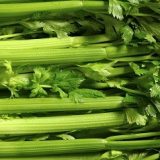Tips for Healthy Living:

Geri Wohl, Certified Nutrition Consultant Better Eating Coach
Swiss Chard—The Other Super Leafy Green
By Geri Wohl, CNC
We’ve all heard that spinach is a great vegetable to incorporate into one’s diet. But, there’s another leafy green that also possesses powerful nutritional properties–Swiss chard. Even though the name implies that chard is from Switzerland, it actually originated in the Mediterranean, specifically Sicily, and it’s a favorite food in Italian and Mediterranean cooking. Swiss chard gets the “Swiss” classification from a Swiss botanist, responsible for its scientific name. As a result, the vegetable bears his nationality. Chard dates all the way back to the 4th century and was favored by the Greeks and Romans for its medicinal qualities. Chard juice was used as a decongestant and its leaves were known to neutralize acid and have a laxative effect on the body.
Swiss chard is a beautiful vegetable. If you see it growing in the garden, it has a stalk that is vibrant green, yellow or red and grows to about two feet tall. The wide leaves attached to the stalk fan out and can be either smooth or curly. Both the stalk and the leaves are edible, although the thicker stalks are more fibrous and can be harder to chew.
Chard is a powerhouse of nutrients while being low in calorie–100 grams of chard only contains 19 calories! Chard is an alphabet full of vitamins and minerals that includes vitamins A, B, C, E and K and the minerals magnesium, copper, manganese, potassium and iron. It also contains beneficial dietary fiber and protein. And lastly, it contains at least three-dozen phytonutrients that have anti-inflammatory properties and neutralize free radicals formed either through metabolic processes or external sources. Let’s take a closer look at the various benefits that chard offers us.
- Blood and Circulatory System Health: Vitamin K in conjunction with iron found in chard promotes healthy blood and normal blood clotting. It can also help to prevent extreme bruising. Be aware that those on the blood thinning medication, Coumadin, need to take into account the vitamin K levels found in chard to monitor their clotting factors.
- Blood Sugar Regulation: The dietary fiber and protein found in chard help to stabilize blood sugar. More stable blood sugar reduces the likelihood of insulin resistance and ultimately diabetes. In addition, chard contains the antioxidant, syringic acid, which helps regulate blood sugar by slowing down the breakdown of sugar. For more about fiber and blood sugar, see my article Tea Time. Incorporating chard also is beneficial for weight loss as it has so few calories and no fat.
- Bone Health: The extremely high amount of vitamin K found in chard is very supportive of bone health. One cup of chard contains 389% of the daily value (DV). Vitamin K triggers the activation of a non-collagen protein in bone. This protein works with calcium, also found in chard, to build bone. When vitamin K levels are too low, the bone building process is compromised and bone formation is weak. In studies, regular consumption of chard has been found to prevent osteoporosis.
- Brain and Nervous System Health: While vitamin K is known for its role in bone formation, it also supports our nervous system. Vitamin K is essential for the formation of the myelin sheath, the protective layer around the nerves that is needed for optimal transmission of signals from the nerves to our muscles.
- Eye Health: Chard is also high in vitamin A. 100g has 122% of the DV. Vitamin A is an important dietary component for improved vision including reduction of night blindness, cataracts, glaucoma and age-related macular degeneration. Beta-carotene as well as the other carotenoids (lutein and zeaxanthin) are all important antioxidants that may reduce our susceptibility to disease or other conditions. Lutein and zeaxanthin are actually found in the retina and the lens of the eye, suggestive of their importance in our vision.
- Heart Health: Potassium in chard helps to regulate water concentration either internal or external to the cell. Potassium directly counteracts sodium. For those with heart issues, particularly related to water retention, consuming chard might result in a diuretic effect.
- Immune Health: Vitamin A found in chard strengthens our immune system from the various bugs especially at this time of year. In particular, vitamin A supports the mucous membranes found in our respiratory systems resulting in improved immunity from sore throats, flu, colds, bronchitis and sinusitis. Vitamin A has also been shown to be supportive of the skin and hair. For more about skin health, see my article Super Summertime Skin.
Chard is easy to grow and delicious to eat. It should be washed well to remove any dirt. Trim off the thick stems from the bottom and use both the stalk and leaves. Swiss chard can be used in salads, braised or in frittatas. For a delicious frittata recipe, see my recipe Late Sprint/Early Summer Brunch 2012. Chard can also be easily substituted for spinach. Chard will keep in the refrigerator for several days. It should be vivid in color without any brown or yellow spots.
Note that chard like spinach is high in oxalates. People with a history of oxalate-containing kidney stones should limit their intake. Boiling chard will also reduce the oxalic acid but at the expense of other vitamins.
Here’s to spinach’s lesser-known cousin. Enjoy all the benefits of Swiss chard!
© Geri Wohl, CNC









